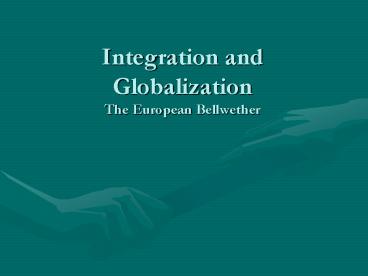Integration and Globalization The European Bellwether
1 / 20
Title:
Integration and Globalization The European Bellwether
Description:
hallmark of our global era. Borders less important. Faster growth ... Relatively illiberal economies are less equipped to deal with globalization ... –
Number of Views:83
Avg rating:3.0/5.0
Title: Integration and Globalization The European Bellwether
1
Integration and Globalization The European
Bellwether
2
Economic integration is ahallmark of our global
era
- Borders less important
- Faster growth
- Benefits most people at most times
3
From 6 to EU-15
4
To EU25 and beyond
5
Overview
- Economic integration promotes growth and
increases exposure to policy competition - Relatively illiberal economies are less equipped
to deal with globalization - Europe is such an economy
- Should Europe further liberalize its economy or
better coordinate its policies? - Europe is at a crossroads and so are we
6
What is economic integration?
- Nations liberalize their economies
- Trade agreements
- Investor protections
- Worker visas
- These policies increase exposure to globalization
and boost economic growth
7
But exposure to globalization exacerbates policy
pressures
- Workers and businesses seek better business
climates - Recipients seek generous safety nets
- High-tax high-benefit nations penalized
- Greater penalty in a more economically integrated
world
8
EU economies uniformly less free
9
EU has relatively low growth
10
relatively high unemployment
11
and low productivity growth
12
But it was not always so
13
This is a globalization story
- Inflexible, high-tax policies more damaging when
goods, capital, labor more mobile - Europe kept up in the low-tech less-global 70s
- Europe fell behind in the 80s and 90s as
globalization accelerated
14
Some see policy competitionas the problem
- A recent OECD report Developed world should
eliminate harmful tax competition - German finance minister Low-tax nations must
raise taxes in the name of fairness - As long as some nations are more competitive than
others, globalization will benefit some nations
more than others
15
and policy coordination as the answer
16
Policy coordination can bringintegration without
liberalization
- Sweden Farm subsidies too low
- Czech Republic Labor laws too lax
- Poland VAT too low
- What path will the EU follow in the future?
17
Free trade in services defeated
18
International capital movement feared
19
Yet there is hope for freer EU markets
- EU head speaks movingly of liberalization
- More efficient financial markets?
- Clout of organized labor reduced
- Sea-change in German corporate strategy?
- Fewer protections for new workers
- New opportunities for French youth?
20
The crossroads revealed
- Some EU states want more social protection
- Other EU states want faster growth
- How can Europe simultaneously satisfy these
competing visions? - It cant and the policy choices made by the EU
and elsewhere will go a long way toward
determining the ultimate fate of globalization































